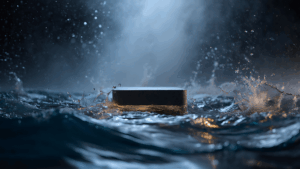If you do an online search for water safety tips, you’ll get plenty of advice about drowning prevention and safety equipment. However, there’s very little about safety regulations when it comes to the quality of the water itself and the subsequent risks from pollution. Yet there’s more interest in water-based leisure activities than ever before, with the growing popularity of open-water swimming, triathlon events, paddle boarding, canoeing and kayaking, as well as the more recent trend to have inflatable aqua parks on lakes.
In a man-made and properly maintained water park environment, the risk of infection from the microorganisms present will be low. The use of cleansing chemicals such as chlorine will kill germs and bacteria, keeping swimmers safe. However, when it comes to natural water courses where chemicals cannot be used – rivers, lakes and the sea – users are at much more risk from contaminants in the water. Poor water quality can cause problems such as diarrhoea, eye infections, ear pain, skin rashes, coughs and lung infections.
Preventing and avoiding waterborne infections
The best thing to do is check to see if the water quality is suitably high before using a freshwater-based aqua park. Unfortunately, this is not as easy as it sounds. The majority of UK water quality testing – England, Wales, Scotland and Northern Ireland – is carried out in coastal areas. Inland waters that are used for leisure activities and aqua parks are few and far between and water quality testing at these sites is more limited. Indeed, it wasn’t until after a lot of local campaigning that the first designated bathing site was announced at the end of 2020. Its dedicated status means the Environment Agency will monitor pollution levels to ensure it is safe enough to swim in. To make the waters at popular recreational sites a lot safer to play in, The Rivers Trust has begun a campaign to get more inland waterways designated as bathing sites by the Environment Agency.
The disgusting bit…
According to the American Centers for Disease Control and Prevention (CDC), most of us will have 0.14 grams of faeces stuck to our skin at any one time. When we’re splashing around in lakes and rivers, this will wash off our skin. If someone already sick with diarrhoea swims in the water and a small amount of their faeces washes off their skin, it will contaminate the water. If someone then accidentally swallows the contaminated water, they could also become sick.
What you can do to protect yourself
Water testing strips are commercially available which quickly show how much bacteria or nitrates are in the water. If you are concerned there might be water pollution in the aqua park you’re visiting, allowing you to quickly assess the bathing water quality.
Avoid swimming in rivers and lakes after heavy rainfall – open waters will not only become more dangerous because of the faster flow, they are also more likely to become contaminated with overflow from sewage storm drains.
If at all possible, keep the water out of your mouth and avoid swallowing it. There is an urban myth that drinking cola after swallowing contaminated water will prevent illness because of the acid in the cola, but there’s no scientific study that backs this up. In fact, the acid in the cola is around 10 times weaker than your own stomach acid. One study showed that the strongest antibacterial liquids are actually vinegar and olive oil, with wine (red and white) killing many strains too.
As ear infections are commonly caused by contaminated water, it is also a good idea to keep yours as dry as possible. Use swimming ear plugs or dry your ears thoroughly when you get out of the water.
Finally, have a shower as soon as possible after your visit to a lake aqua park or any activity in the water.
What you can do to protect others
There are a number of measures you can take to make the water safer for everyone. Shower before you go into the water to remove any faecal matter on your skin that could contaminate the water. It will also wash off any chemicals you use, such as sunscreen which can be very harmful to marine life. If you have had diarrhoea, then avoid going into the water for at least two weeks. By doing what we can to keep the UK’s waterways clean, we can protect human health as well as the health of the ecosystem.
Water quality importance for businesses
If a business has been closed for a period of time, the building water system may become stagnant. This can cause the water quality to deteriorate. It is vitally important to restore the flow of fresh water into premises to avoid the build-up of harmful bacteria and potential health risks.
Simple steps can be easily taken to remove stagnant water tank systems, such as:
- Flushing out the water systems by running taps, flushing toilets. Tap water should be cool to touch and clear.
- After flushing though the cold water, repeat the process with the hot water outlets.
- If the premises has any internal filters or water softeners, these should be checked to ensure they are working correctly as outlined in the manufacturer’s instruction manual.
Water efficiency measures and advice
Making a few simple changes to your business will help you to save water, save money and reduce your carbon footprint. Better for you, better for the environment.
Whether you are a micro-business or a large multi-site organisation, we can help you with water saving advice and services. Read more about our water and wastewater management services or if you are a small business, you can read more on how to manage your water costs by way of our business water efficiency services.



